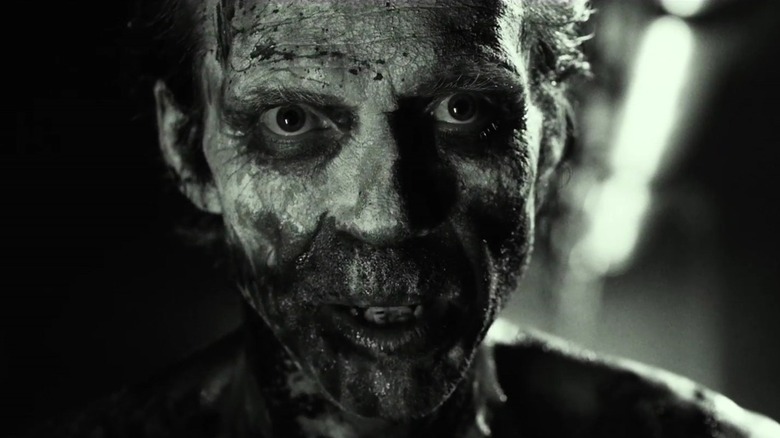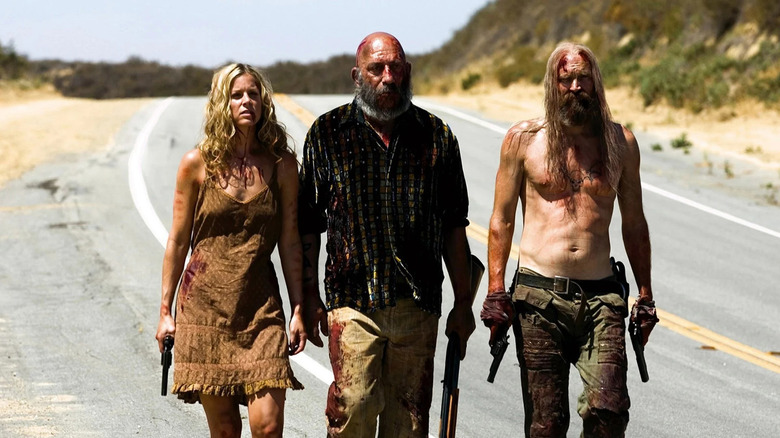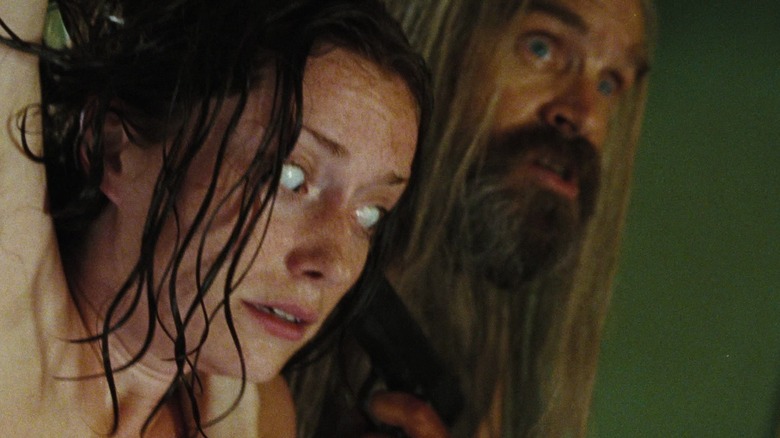Rob Zombie Has An Unexpected Take On Heavy Metal's Place In Horror Films
It's a cliché as old as the musical genre: If a filmmaker wishes to use a handy piece of cinematic shorthand in order to communicate that a character is a bad, scary, violence-prone person, then heavy metal will be played on the soundtrack.
Heavy metal as a descriptor first came into vogue in the mid-1970s to describe the sound of louder, "heavier" types of rock coming from bands like Deep Purple and Led Zeppelin. Throughout the '70s, bands like Motörhead, Judas Priest, Iron Maiden, and Saxon would push the genre forward, earning it a generation of hardcore fans and no small amount of hand-wringing from concerned parents and uptight "moral majority" groups (a response that was intentionally sought). Like all popular genres, heavy metal eventually fractured into various movements and dominant aesthetics; The genre could now be said to include bands as far removed from one another as Stryper and Cradle of Filth.
Rob Zombie, initially a member of the metal band White Zombie prior to his solo music career and filmmaking career, added an interesting aural wrinkle to the genre by including electronic remixing and techno beats underneath the heavier metal guitars and bass. Add a distinct horror-movie-forward set of lyrics about sex, violence, and living dead girls, and you have a notable niche in pop music history.
Despite being known as a heavy metal musician, one might note that Zombie tends not to use heavy metal music in his own movies. Indeed, a remarkable sequence in his film "The Devil's Rejects" has several characters being gunned down to Lynyrd Skynyrd's "Freebird." In a 2005 interview with the website eatmybrains, Zombie explains why he eschews metal when it comes to filmmaking.
'Really creepy and sad'
Zombie, despite loving metal, seemed to have been all too aware of how metal is used in movies. It's rare that a character will be listening to heavy metal in their car, exit, and introduce themselves friendly to a startled protagonist. At least there was Bill & Ted and Wayne & Garth to prove that metal fans are also, typically, pretty nice guys. Zombie wanted to convey different emotions in his films. Luckily, he had a deep well of pop music knowledge to draw from, and was able to find other artists from the classic rock era that would, to his ear, be creepier than any metal song. In the eatmybrains interview, Zombie refers specifically to his music selections in his film "The Devil's Rejects," saying:
"One thing I've always hated is when people use heavy metal music in horror movies. It's just so obvious, so over the top. So something like the Terry Reid songs we used in the film — they're beautiful but they're also really creepy and sad. The whole movie to me has a sad overtone to it. You know that the Firefly family are sort of doomed; you know that the Sheriff is sort of doomed. So the whole thing is really sad and those songs were just so perfect for that mood."
The Firefly family — a clan of filthy, nihilistic serial killers — are the main characters of "The Devil's Rejects," and they will not emerge unscathed. Well, until their deaths were retconned for "3 From Hell," Zombie's 2019 sequel. Terry Reid is the English rocker known for "Bang Bang (My Baby Shot Me Down)" and many others.
Outlaw music
The kind of stylized, rubber-mask, haunted house horror that marked Zombie's music is not typically a part of his movies ("House of 1000 Corpses" notwithstanding). His movies tend to be about misanthropic outlaws who take pleasure in death and fear no authority beyond their own casual bloodlust and their ties to one another. The villains in "The Devil's Rejects" are presented with a weirdly respectable integrity; They torture and kill, but they also have formed a close-knit, f***-everything family, free of the bonds of earthly morality.
To Zombie, metal doesn't describe characters like that. For Zombie, he heard The Allman Brothers Band. He said:
"The Allman Brothers' songs, they're like sad outlaw music. Not heroic at all. It's like that really great Manson documentary that came out in '70s that has this sort of flute folk music running through it. That is so creepy. Nice music with horrific images. A lot of people don't get it. They're like 'oh yeah that's funny, it's supposed to be a funny juxtaposition.' I wasn't thinking that it would be funny. I just thought it would have a lot of emotion."
The film Zombie refers to is Robert Hendrickson's and Laurence Merrick's 1973 film "Manson," a truly terrifying film currently available on Fubo.
Zombie's next film is a feature version of the 1960s sitcom "The Munsters" and will be rated PG. It's likely that "The Munsters" will feature more surf rock (like the show's theme song) than metal. If Zombie declines to use his "Munsters"-inspired hit single "Dragula" in his new movie, it will be a display of the utmost restraint.


